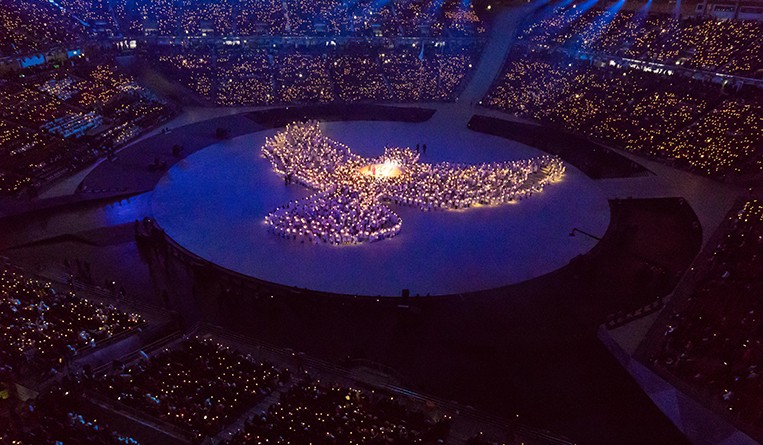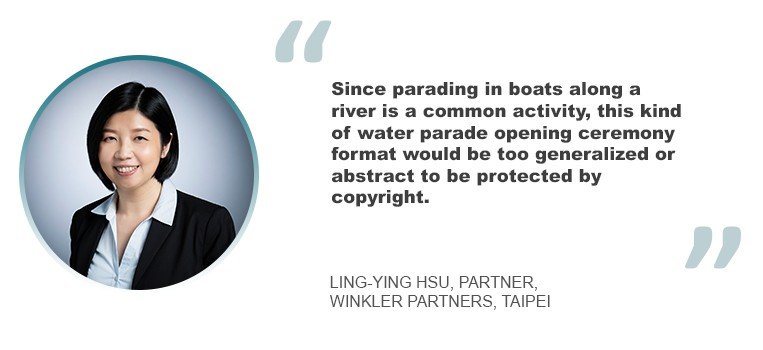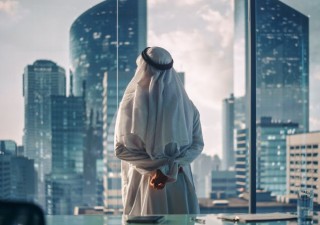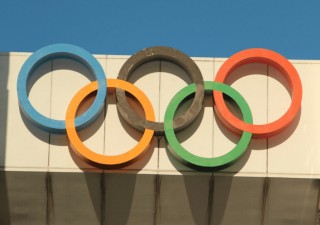2024 Paris Olympics: Touting the novelty of an opening ceremony by the river
31 May 2024

The 2024 Paris Olympics will break from tradition and hold its opening ceremony in a boat parade along the Seine River. Pictured is the opening ceremony for the 2018 Winter Olympics in Pyeonchang, South Korea. Photo courtesy of the International Olympic Committee.
As the 2024 Paris Olympics approach, Espie Angelica A. de Leon asks whether a boat parade of athletes on the Seine can be protected by intellectual property law.
A hush falls over the audience. And then, comes the announcement: “Ladies and gentlemen….please welcome the athletes of the Games of the XXXIII Olympiad.” With excitement, the crowd, many of them holding their countries’ flags, awaits the entry of athletes from over 200 countries. Decked in their national costumes, formal attire or tracksuits, the athletes are set to take part in 32 sports in several days of thrilling competition.
The sights, sounds and atmosphere at the opening ceremony of every edition of the Olympic Games are always the same; that is, until Paris’s promise of a unique take on this year’s opening salvo. On July 26, 2024, the world will witness a ceremony unlike any other in the history of the Summer Olympics. For the Games of the XXXIII Olympiad, the event will not be held inside a stadium. Instead, it will be held along France’s Seine River. The athletes will not parade around the venue on foot, either. Instead, the parade of nations will have more than 80 boats ferrying the athletes along the famed waterway.
A novelty act indeed, following the examples of other pioneering segments in Olympics opening ceremonies. Among these are 1992 Barcelona, where archer Antonio Rebollo shot a flaming arrow toward the cauldron to light it. Another is 2008 Beijing where gymnast Li Ning was lifted high up in the air and “ran” toward the cauldron to ignite it.
A boat parade of nations on the Seine: Is this copyrightable?
Now it’s Paris’s turn. Interestingly, the city’s unique format for a grand inaugural and all its other elements may be protected by copyright – as an expression of an idea.
“In our view, a novel format for an opening ceremony could be and should be copyrightable under [copyright law], provided that the overall format, including all its unique elements, constitutes a copyrightable expression,” said Ling-ying Hsu, a partner at Winkler Partners in Taipei.
Copyright protection can only extend to the expression of a work. It cannot be applied to the ideas, procedures, production processes, systems, methods of operation, concepts, principles or discoveries underpinning the creative work. Concepts and ideas are the foundations of human creativity. Thus, these should be part of the public domain.

“Because of the foregoing principle, since parading in boats along a river is a common activity worldwide – such as the water parade at Venice Carnival, the Tenjin Matsuri in Osaka and even at theme parks – we are of the opinion that holding the opening ceremony at a river and delegates parading in boats along the river would likely be considered mere concepts and ideas of how to hold an opening ceremony. This kind of water parade opening ceremony format would be too generalized or abstract to be protected by copyright,” explained Hsu.
“It would not be appropriate to grant a specific person or organization exclusive rights over this kind of format for an opening ceremony,” she stated. “Any other event should be free to use the same water parade concept to hold their opening ceremony without being exposed to the risk of copyright infringement.”
Being a concept, there are several methods to express or implement this concept or idea of holding the 2024 Paris Olympics Opening Ceremony along a river and having a fluvial parade of athletes. Such methods of expression would be where the copyrightable work could be and should be formed.
Taiwan does not have, as of yet, any judicial decisions that directly evaluated the format of opening ceremonies in connection with copyright protection. However, there were similar cases that did determine whether the format of a TV show, event or similar production did constitute a copyrightable expression. Hsu explained: “The judge looked at what special arrangements were used. For example, if the format of a TV show had a unique style of competition, which could be achieved through the hosting style, competitor interaction, game rules, set design, audience seating and how the audience is involved in voting for the winner, then the format would be deemed to be a copyrightable expression. In other words, the ‘special composition’ should make the format immediately recognizable when it is seen.”
Hsu said the firm believes that a Taiwanese court would use a similar judicial standard to evaluate whether the format for an Olympic Games opening ceremony is copyrightable. “If we were to apply that decision to the Olympics opening ceremony, all the different techniques and specific ways which are used to arrange the structure, incidents, and scenes of the opening ceremony that possess special characteristics could be deemed as its copyrightable format. As such, we believe if the organizers of the 2024 Paris Olympics invest a certain amount of effort to develop a specific format that contains unique elements spread over the opening ceremony at the Seine River, then it would form a characteristic style and leave a special impression in the audiences’ mind,” she stated.
These unique elements may include unique procedures and formations for the athletes’ march and configuration of the venue, such as set design.
It may also include a special composition to the arrangement of the event. According to Hsu, the Seine River is just the location for the opening ceremony. For it to be part of a copyrightable expression, it would need to build into the use of the location by incorporating elements of French culture, history and/or arts. “For example, the opening ceremony can consist of set design, dance, light and music performances that are steeped in French culture in a way that evokes images of a specific incident in French history or a famous French landmark,” Hsu said.
Another unique element is lighting design, or perhaps how a large collection of lights in a variety of different shapes, colors and sequences, could be used as part of the arrangement of the opening ceremony to create a unique arrangement to the format. “Perhaps if the lighting display was linked to a part of French culture, such as displaying a famous French landmark and set in a sequence that matched the rhythm and tempo of an iconic French song, then it’s possible it would be deemed as creating a unique format to the composition of the opening ceremony,” said Hsu.
“Under these circumstances, the format of the 2024 Paris Olympics’ opening ceremony on the Seine River would likely go beyond merely an idea or concept and constitute a copyrightable expression,” she stated.
Whether “format” constitutes “work” is also part of the discussion.

“The format itself, hosting it in an open-air venue or other potential formats, will not be copyrighted because such format does not constitute ‘work’ and could hardly prove its ‘originality,’ an essential element for ‘works’ to enjoy copyright,” said Guo Cai, a partner at Jin Mao Law Firm in Beijing. “But, the presentation of the event is perfectly entitled to copyright.”
She added that what matters is whether the presentation of events through streaming or broadcasting embodies some level of creativity. “The presentation of the opening ceremony, such as the sequence of images broadcasted, the edits of videos or images and others, certainly incorporates human ideas and will be regarded as ‘work’ protected for its copyrights,” said Cai, a professional volunteer at the 2008 Beijing Olympics.
Elena Szentiványi, a director at Henry Hughes Intellectual Property in Wellington, agrees that the 2024 Paris Olympics opening ceremony’s staging on a river with an athletes’ parade in boats, is not eligible for copyright protection. “New Zealand’s Copyright Act 1994 does not protect an idea or concept but a particular expression of that idea,” she said.

“Therefore, copyright comes into existence on the completion of the particular work. A performance such as the Olympics opening ceremony will in fact comprise a collection of separately created literary, artistic and musical works which are combined and performed together to create the unique event that is the opening ceremony. Under New Zealand law, copyright does not exist in a literary or dramatic or musical work unless and until the work is recorded, in writing or otherwise. The performance of the works at the opening ceremony does not constitute publication of the works.”
Other IP rights associated with the Olympic Games opening ceremony
Olympic Games opening ceremonies are always a grand showpiece. The audience, including those watching online or on TV, look forward to the spectacle about to unfold. All of the parts making up this spectacle – from the theme song, music, dance choreography, drama to the fireworks display and accompanying video presentations, among others – are all protected globally by copyright.
Apart from the parade of nations, marvelous production numbers and dramatic narratives, another much-awaited segment of any opening ceremony is the arrival of the torch with the Olympic flame and the lighting of the cauldron. The designs of the torch and cauldron are also copyrightable.
Even the design of the stadium where the ceremony takes place can be protected by copyright. Months before the start of the Games, the venues for the different multi-sport events, including the stadium where the ceremony will take place, already create a lot of buzz, piquing people’s interest and anticipation.
Moral rights and performers’ rights are also part of the equation. Authors of literary, dramatic and musical works including those presented at an opening ceremony of the Olympics have the moral right to be identified as the author and to not have his or her work subjected to a derogatory treatment.
Regarding performers’ rights, Szentiványi explained: “In theory, a performer in the opening ceremony has the right to be identified in any programme accompanying the performance or in some other manner likely to bring the performer’s identity to the notice of a person seeing or hearing the performance. The performer’s right to be identified also applies to any live broadcast and recording made of the performance.”
As opening ceremonies are likely to include a cast of hundreds or even thousands in its production numbers, the right to identify such a large number of performers is not going to be practical. Szentiványi said that New Zealand’s Copyright Act provides for such a scenario as performers’ rights are not infringed if it is not reasonably practical to identify the performers in a huge cast.
Broadcasting and livestreaming rights are also protected by copyright as well as the compilation, curation and arrangement of relevant data.
As for trademark rights, the following are registered for protection: the five interlocking rings that serve as the official symbol of the Olympic Games; other symbols, logos and emblems of the Olympic and Paralympic Games; words and taglines associated with the events such as “Olympic Games,” “Paris 2024,” “Citius, Altius, Fortius”; the mascot, and others. “The mascot [is] an important IP both for the Games’ unique visual identity as well as commercial gains derived from licensed commodities,” said Cai. Some of these may also be registered as industrial designs.
Host cities and those bidding to host the quadrennial event begin registering trademarks and domain names long before the start of the games. Months before the Summer Olympics began in Tokyo in 2021, trademarks for the Paris edition this year and the 2028 Games in Los Angeles had already been registered.
On the other hand, any technologies used during the opening ceremony are protected as patents.
“We would like to note that whether an element regarding a traditional Olympic opening ceremony can be protected with a specific IP law such as copyright law and trademark law, would still be subject to the requirements of the law in question,” said Hsu. “Our preliminary research shows that the host country will enact a special law that specifically provides protection to the Olympic Games-related IP. We are of the opinion that the enactment of this kind of special law is necessary because otherwise a lot of energy would be expended to determine which elements of the Olympic Games-related IP should be protected and which should not.” One example is when a slogan may be too short to meet the minimum creativity requirement. In this case, the slogan cannot be protected under copyright law. However, a special law enacted by the host country may resolve the issue.
There have been security concerns following the bloody terrorist attack at the Crocus City Hall concert venue in Moscow on March 22, 2024. If security threats to the Paris Olympics intensify as July 26 approaches, the event might be held instead at the national stadium, the Stade de France, according to President Emmanuel Macron.
An unfortunate incident, one might say, dousing everyone’s excitement to witness a novelty act in the annals of the Olympic Games. Yet whatever happens, the International Olympic Committee and the sports world are assured that the IP rights of the Games of the XXXIII Olympiad are duly registered and protected. This is more important than any groundbreaking opening ceremony that Olympics organizers are touting to the world.






